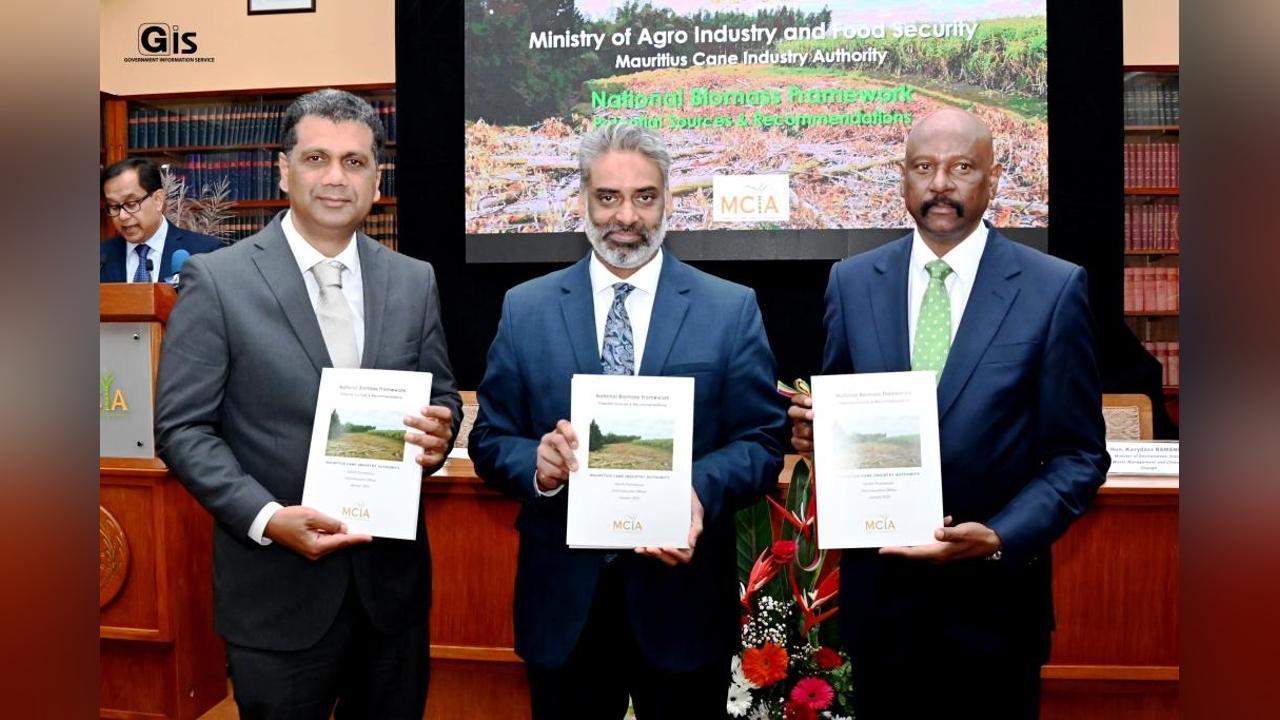Africa-Press – Mauritius. The National Biomass Framework, which had been established under the aegis of the Ministry of Agro-Industry and Food Security with a view to promoting the production of energy from biomass, was launched, today, at the Mauritius Cane Industry Authority in Réduit.
The Framework is in line with Government’s objective of phasing out the use of coal in electricity generation by horizon 2030 and achieving a target of 60% of the country’s energy needs from green/renewable sources in the energy mix.
The objectives of the National Biomass Framework are thus to increase bioelectricity production by promoting and implementing projects for more efficient use of sugarcane bagasse, more trash collection, introduction of higher fibre cane varieties, cultivation of other energy crops, and biomass import.
The Minister of Energy and Public Utilities, Mr Georges Pierre Lesjongard; the Minister of Environment, Solid Waste Management and Climate Change, Mr Kavydass Ramano; the Attorney General, Minister of Agro-Industry and Food Security, Mr Maneesh Gobin; the Ambassador of the European Union to the Republic of Mauritius, Mr Vincent Degert; and other personalities were present at the launching ceremony.
In their address for the occasion, Ministers Lesjongard, Ramano and Gobin underlined the critical role of the sugar cane industry not only as a source of export earning but also in the preservation of the environment and now in green electricity production.
The Ministers are of the view that the Framework was a turning point in Government’s efforts to pursue its green energy transition by making an efficient use of sugar cane. Speaking with one voice, the Ministers elaborated the benefits that implementing the National Biomass Framework would bring to the country.
The benefits listed include fostering sustainable growth with the emergence of a new economic pillar namely the green economy, opening up of new employment opportunities, increasing the country’s energy security by reducing dependence on imported fossils fuel, and contributing to attaining Mauritius greenhouse gas emissions reduction targets.
Moreover, they all mentioned measures presented in the 2023-2024 Budget which would enable the implementation of the Framework. These comprise the provision of funds for the operationalisation of the Biomass Framework, as well as the remuneration of cane trash and woody biomass at Rs 3.50/kWh, similar to bagasse.
The Minister of Energy and Public Utilities, Mr Georges Pierre Lesjongard, also observed that the drop in the share of renewable energies in the energy mix was due to, among others, a decrease of 15% in the production of bagasse, from 861,755 tonnes in 2021 to 728,581 tonnes in 2022.
He thus welcomed the recommendation of the National Biomass Framework, stating that 40,000 hectares would be required to remain under cane cultivation, representing an average production of 3.2 million tonnes of sugar cane, to guarantee a reliable and sufficient input of biomass, to ensure electricity supply.
The Minister mentioned, too, other projects being implemented to meet the 60% Renewable Energy target by 2030, namely the CEB Solar PV Scheme for Domestic Customers and for Educational Institutions Schemes; the setting up of Solar Photovoltaic Farms; and the deployment of renewable energy technologies so as to provide firm power to the CEB grid for 8,000 hours.
For his part, the Minister of Environment, Solid Waste Management and Climate Change, recalled that although greenhouse gas emissions in Mauritius were insignificant, around only 0.01% of total global emissions, Government had committed to reducing the greenhouse gas emissions by 40% by 2030 as part of the updated 2021 Nationally Determined Contribution.
He underscored that Government continued to implement commendable steps to contribute to the global fight against climate change namely by increasing the share of renewable energies by 60%, the phasing out of coal, the development of the Biomass Framework and redirecting 70% of solid waste from landfills by 2030 to promote circularity.
As for the Agro-Industry Minister, he underlined that the cane sector would play a major role in achieving the 60% renewable energy target in the energy mix as the Industry had become an example of circular economy.
He pointed out that Government was making significant efforts to combat falling cane production resulting from both land abandonment and a loss in productivity through initiatives such as the Accompanying Measures to restore Abandoned Cane Lands Scheme, the Cane Replantation Scheme, and the review of land conversion regulations to ‘Lock’ lands under sugarcane production.
For More News And Analysis About Mauritius Follow Africa-Press







